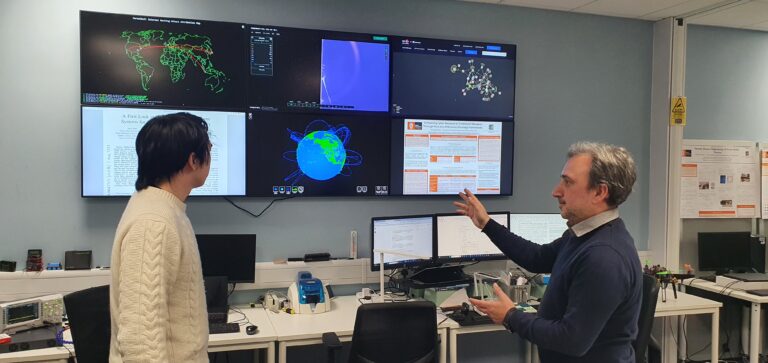
Cyberattacks have become increasingly sophisticated, targeting not only large corporations but also small businesses, government agencies and individuals alike. Today, every click, swipe, and tap generates a trail of data. And the consequences of each breach ripple through economies, compromise privacy and shake the foundations of trust in our interconnected world.
In 2021, hackers exposed the user identities of about 93% of LinedIn’s total user base. In 2023, a New York-based online real estate education platform, Real Estate Wealth Network, leaked over 1.5 billion records in their database to the public. This explains why according to recent reports, cybercrime is projected to cost the global economy US$10.5 trillion annually by 2025.
Hence, an urgent demand for experts capable of safeguarding sensitive information and fortifying digital infrastructures. In response to this growing threat landscape, four universities are stepping up to the challenge. Through comprehensive degree programmes, they are equipping students with the knowledge, skills and hands-on experience required to navigate the complex and ever-evolving field of cyber security.

The ISG might be focused on information security, but it is still interdisciplinary in every sense of the word. Source: Royal Holloway, University of London
Royal Holloway, University of London
With over 35 years of pioneering research and education experience, the Information Security Group (ISG) at Royal Holloway, University of London, has established itself as a global leader in the field, focusing on practical solutions to real-world security challenges. It has the accolades to prove it. The ISG was designated as a UK Government Academic Centre of Excellence in Cyber Security Research, with a gold award from the National Cyber Security Centre (NCSC) as a UK Academic Centre of Excellence in Cyber Security Education. Its Information Security (MSc) is NCSC-certified too.
This programme was designed to meet the evolving needs of the information security landscape. It welcomes students from diverse backgrounds, fostering an environment where varied experiences enrich the learning process. The curriculum supports several pathways to cyber practice, drawing upon the expertise of over 20 academics specialising in information security. Hence its reputation as one of the broadest information security programmes in the world, enabling students to specialise in just about any aspect of information security — from law and regulation, cyber security, information and digital security to fraud detection and critical national infrastructure security.
ISG’s commitment to excellence is further highlighted through its courses’ continual evolution based on insights directly from industry and government partners. Relevance aside, flexibility is another perk that sets this MSc apart — students can complete the qualification over one year full-time, two years part-time or three to five years (Continuing Professional Development). Meanwhile, the two-year, full-time Information Security with a Year in Industry (MSc) programme takes things up a notch, equipping students with a solid foundation before immersing them in first-hand experience through an entire assessed year in industry. By design, both routes are ideal pathways to doctoral studies within ISG and to build successful careers in cyber security and beyond. Click here to learn more about the world-leading department.

Cardiff works with the British Computer Society (BCS) to align degrees with industry demands. Source: Cardiff University/Facebook
Cardiff University
Situated in Cardiff’s vibrant and bustling heart, Cardiff University strives to produce future-focused students through its Data Science Academy — a hub for data-intensive science. The academy is nestled within the university’s School of Computer Science and Informatics, which has established itself as a leading researcher in the field, with 95% of students in highly skilled employment 15 months after graduating.
This level of success is fueled by the fact that plenty of Cardiff’s qualifications were designed alongside the British Computer Society (BCS), ensuring they are relevant to the latest industry demands. For example, the Cyber Security (MSc) teaches learners to address the key security issues faced by global communications and information systems. It also incorporates project-based learners through real-world datasets and problems. Meanwhile, the Data Science and Analytics (MSc) equips students with an array of in-demand competencies for extracting and handling ‘big data’.
All routes grant students access to top-notch facilities, including computer and cybersecurity labs, Makerspace and IT workshops. This exposure guarantees they graduate with a profound understanding of computer systems, networks, and programmes, recognising their impact on various aspects of life.

The School of Informatics provides an environment for a wide range of studies focusing on understanding computation in both artificial and natural systems. Source: University of Edinburgh
University of Edinburgh
The University of Edinburgh has launched successful careers in different fields of technology. Graduates comfortably secure roles such as software engineer, hardware engineer, app developer, web developer, programmer, and so forth. They can be found in companies such as Google, Facebook, Amazon, IBM, SkyScanner, Intel and Samsung, among many others.
Edinburgh’s School of Informatics offers postgraduate computer science studies where students are trained in niche areas of computer science, becoming experts and changemakers in the field. These degrees help students specialise in their area of interest while developing the technical and soft skills needed to succeed in the industry.
The school provides a fertile environment for a wide range of studies focusing on understanding computation in both artificial and natural systems. Students keen on evaluating, designing and implementing secure, trustworthy systems in complex distributed systems can pursue the Cyber Security, Privacy and Trust MSc. On this route, they will be trained alongside experts who specialise in Secure Software, Cryptography, Secure Hardware, Verification, Post Quantum, Data Privacy, Usability, Fintech, Health, Smart Contracts, Distributed Ledgers, and Privacy Preserving Data Mining.

Queen’s University Belfast’s School of Electronics, Electrical Engineering, and Computer Science partners with many major software companies based in Ireland. Source: Queen’s University Belfast/Facebook
Queen’s University Belfast
Queen’s University Belfast is a leader in research and innovation, renowned for producing highly skilled graduates. The School of Electronics, Electrical Engineering, and Computer Science, located in the heart of Europe, benefits from the university’s strategic location with many major software companies based in Ireland. As part of the prestigious Russell Group, the university offers students access to networks, internships and employment prospects.
The Applied Cyber Security MSc is an apt choice for learners looking to meet the global need for cyber security skills. Certified by the National Cyber Security Centre (NCSC), the UK’s leading cyber security organisation, the programme explores cutting-edge cyber security topics, like cryptography, computer forensics, network security, secure software development and penetration testing. It also investigates the increasingly important legal and ethical issues in cyber security.
To apply their newfound skills, students can access some of the best facilities, including state-of-the-art laboratories for microelectronics, circuits, software engineering, and more. They can practise under the supervision of experienced faculty who provide great support throughout their studies. The institution also offers elite opportunities for learners to excel in their careers. As part of a vibrant community, students here can engage in exciting research projects and collaborate with industry partners, enhancing their skills and knowledge.
*Some of the institutions featured in this article are commercial partners of Study International










